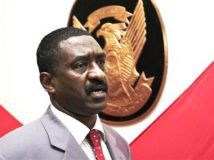Sudan says will Allow UN official to visit Darfur
April 5, 2006 (KHARTOUM) — Sudan said Wednesday it would allow U.N. Undersecretary Jan Egeland to visit Darfur, three days after it barred his flight to conflict-ridden region of the country.
 “We reiterate our commitment to receive concerned officials from the United Nations and all other those who are engaged in extending humanitarian aid and assistance,” Sudan’s state minister for foreign affairs, Al-Samani Al-Wasleea, said in a press statement.
“We reiterate our commitment to receive concerned officials from the United Nations and all other those who are engaged in extending humanitarian aid and assistance,” Sudan’s state minister for foreign affairs, Al-Samani Al-Wasleea, said in a press statement.
The visit of Egeland, the U.N. Undersecretary for Humanitarian Affairs, had been postponed for 10 days because of “internal reasons,” the statement said, without elaboration.
Egeland arrived in southern Sudan on the weekend, but was told his plane wouldn’t be allowed to land in either Khartoum, the national capital, or Darfur, where U.N. agencies are providing relief and assistance to hundreds of thousands of people.
Tuesday, the U.N. Security Council expressed concern at Sudan’s decision to bar Egeland and U.N. Secretary-General Kofi Annan expressed “regret” at the move.
The top U.N. envoy in Sudan, Jan Pronk, had written to the government asking for an explanation of its barring Egeland, who is due to report to the Security Council on the situation in Darfur.
Egeland said Monday he suspected the government didn’t want him to see what was happening in Darfur.
“I can only believe that they don’t want me to see how bad the situation has become for the civilian population in South Darfur, in West Darfur,” Egeland told The Associated Press. He recalled that he had also been barred from visiting Darfur in 2004 “when ethnic cleansing was at its worst.”
The U.N. has described Darfur as the site of the world’s gravest humanitarian crisis. The 3-year-old conflict setting the Arab-dominated government and militias against ethnic African tribes has left some 180,000 dead — most from disease and hunger — and displaced another 2 million people from their homes.
Sudan’s government and rebels in Darfur have made little headway in peace talks in Abuja, Nigeria.
(ST/AP)
